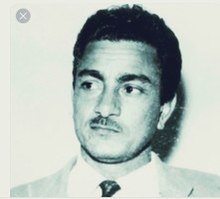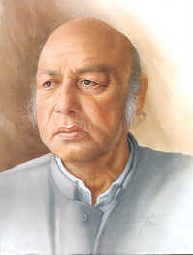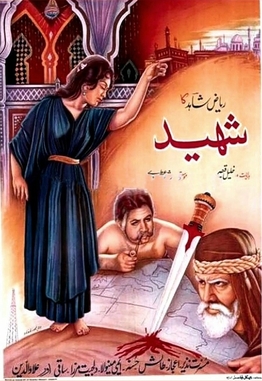Riaz Shahid ریاض شاہد | |
|---|---|
 | |
| Born | 1927 |
| Died | 1 October 1972 (aged 44–45) Lahore, Pakistan |
| Nationality | Pakistani |
| Occupations |
|
| Years active | 1962–1972 |
| Awards |
|
Riaz Shahid (1927 – 1 October 1972) was a Pakistani filmmaker, film writer, and a journalist.
Riaz Shahid ریاض شاہد | |
|---|---|
 | |
| Born | 1927 |
| Died | 1 October 1972 (aged 44–45) Lahore, Pakistan |
| Nationality | Pakistani |
| Occupations |
|
| Years active | 1962–1972 |
| Awards |
|
Riaz Shahid (1927 – 1 October 1972) was a Pakistani filmmaker, film writer, and a journalist.
Riaz Shahid was born in 1927 in Quetta, British India. He belonged to an ethnic Kashmiri family. [2] He was the father of a famous Pakistani film star Shaan Shahid. Shaan was only one year old, when his father died. [3] His real name was Sheikh Riaz, but was called by his nickname Shahid. He was educated at Islamia College, Lahore, Pakistan. Riaz lived in Lahore where he started his career as a journalist for the newspaper Chataan and later joined Faiz Ahmed Faiz's Lail-o-Nihar. He also wrote a novel named Hazar Dastaan. [3] [4]
Riaz Shahid was introduced as a story and dialogue writer to the Pakistani film industry by his friend, actor Allauddin, in film Bharosa (1958). [4] In 1962, Riaz started his film career as a director for the film Susraal (1962 film). Collaborating with the noted progressive poet, Habib Jalib, he went on to write or direct several films like Zarqa (1969), Shaheed (1962), Farangi (1964), Khamosh Raho (1964) and Yeh Aman (1971). [3] [4]
Riaz Shahid was married to then famous actress Neelo and had three children. The first child was a daughter and was named Zarqa followed by two sons Shaan (actor), who is now a well-known Pakistani film actor and Sarosh, who also worked in a couple of Pakistani movies. [3] [4]
Riaz Shahid died of leukemia on 1 October 1972 at Lahore, Pakistan. [3] [4]
A noted Pakistani film actress and director Sangeeta is quoted as saying, "Riaz Shahid was a visionary. Whatever is happening in Kashmir today, he showed it well in the 60s. He was the top director of his period and we should be proud that such people were once a part of our industry". [3]
Another film producer Choudhry Ejaz Kamran reportedly said, "Riaz Shahid stood out for not just his craft but his contribution to meaningful cinema. Cinema that was both political and imppressive. Shahid directed super hit films that are now considered guide books for upcoming film-makers. While he dabbed into a variety of genres, he always preferred to do films based on serious and revolutionary ideas". [3]
| Year | Title | Director | Producer | Screenwriter | Ref. |
|---|---|---|---|---|---|
| 1958 | Bharosa | ||||
| 1959 | Neend | [5] | |||
| 1960 | Clerk | [6] | |||
| Susral | [6] | ||||
| 1962 | Shaheed | [3] [7] | |||
| 1964 | Khamosh Raho | [8] [3] | |||
| Farangi | |||||
| 1966 | [8] | ||||
| Badnaam | [6] [4] | ||||
| 1969 | Zarqa | [6] [7] | |||
| 1971 | Gharnata | [4] [6] | |||
| Yeh Aman | [3] [6] | ||||
| 1974 | Bahisht | [6] | |||
| 1978 | Haider Ali |

Agha Ali Abbas Qizilbash was a Pakistani actor who made his debut in 1947 and was mostly known and recognized in Pakistan for playing character actor or villain roles. Talish was honoured by a Pride of Performance award, by the Government of Pakistan in 1989.

Mohammad Ali was a Pakistani actor. He was known as Shahenshah-e-Jazbaat (Urdu: شہنشاہِ جذبات), meaning The Emperor of Emotions. A versatile performer, he acted in dramatic, romantic, and historical movies. He was voted among 25 of the greatest actors of Asia in a 2010 CNN poll.
Noor Bukhari is a Pakistani former actress, director, model and television host. She has been featured in several TV shows, films and commercials. During her film career, she appeared in 44 Urdu Films and 20 Punjabi Films.

Armaghan Shahid PP, better known by his stage names Shaan Shahid or Shaan, is a Pakistani actor, producer, model, screewriter and director. Shaan has established himself as one of the most popular leading actors of Pakistan.

Habib Jalib was a Pakistani revolutionary poet and left-wing political activist who opposed martial law, authoritarianism, military dictatorship and state oppression. He wrote several poems in Punjabi and Urdu and was referred to as the "poet of the masses" by his contemporary Faiz Ahmad Faiz.

The film industry of Pakistan, consisting of motion pictures, has had a large effect on Pakistani society and culture since the nation's independence. Pakistani cinema is made up of various sub-industries, including Lollywood, which makes motion pictures in Urdu and Punjabi. Lollywood is one of the biggest film industries in the country.
Muzaffar Adeeb, known mononymously as Adeeb, was a Pakistani film actor. He appeared in 38 Indian films from 1940 to 1962, although he did not start performing in films very actively until the 1950s. In 1962, he shifted from Bombay, India, to Lahore, Pakistan and resumed his film career that lasted until his death with over 500 films to his credit.
Parveen Rizvi, better known as Sangeeta, is a Pakistani film actress, filmmaker and director of television drama serials.
Deeba is one of Pakistan's most popular actresses in the 1960s and 1970s. She is best known for her romantic and tragic roles in Urdu and Punjabi films and for her iconic beauty, earning her the nickname the Pakistani Mona Lisa. Deeba also received two major awards: the Nigar Award and the Pride of Performance.
Neelo Begum was a Pakistani veteran film actress. She made her film debut in 1956 with a Hollywood film Bhowani Junction. She was known as The Queen of Romance and The Princess of Romance for her portrayal of romantic roles. She worked in more than 134 Pakistani films including Urdu and Punjabi language films.
Syeda Mehrbano Kazim, known by the stage name Juggun "Jay" Kazim, is a Pakistani Canadian actress, television host, and YouTube personality. She has worked in numerous Pakistani and Canadian films. She is the brand ambassador for Garnier Fructis Pakistan.
Khamosh Raho is a 2011 Pakistani Urdu language film directed by Altaf Hussain. It stars Shaan Shahid and Juggan Kazim in lead roles.
Allauddin Butt, better known as simply Allauddin (Urdu: علاءُ الدین; 2 February 1920 – 13 May 1983) was a Pakistani actor who worked in Pakistani Lollywood movies. His film career spanned over 4 decades.
Abdul Rasheed Attray, also known as Rasheed Attre, was a Pakistani film score composer.
Ejaz Durrani, known mononymously as Ejaz, was a Pakistani film actor, director and producer active from 1956 to 1984. He was married to legendary Pakistani actress-singer Noor Jehan. He is mostly remembered for his portrayal of Ranjha in the film Heer Ranjha (1970). He was especially known for portraying Punjabi culture folk heroes in epic love stories such as Heer Ranjha and Mirza Sahiban.
The ARY Film Awards, commonly known as The AFA's, is an annual Pakistani awards ceremony honoring the cinematic achievements of film industry. Winners are awarded the golden statue, officially the ARY Film Award of Merit, that is much often known as an AFA trophy. The awards, first presented in 2014 at Golf Club, Karachi, are overseen and organized by ARY Digital Network and Entertainment Channel. ARY Film Awards became an electoral race to the trophy to best film in any category, as per being the first awarding ceremony of reboot era of Pakistani Film Industry. ARY Film Awards are the first film awarding ceremony after the demolishing of Pakistani oldest awarding ceremony Nigar Awards.

Shaheed is a 1962 Pakistani Urdu language music blockbuster classical film directed and produced by Khalil Qaiser under the production banner of K. K. Productions, and was a new banner that Qaiser formed.
Yeh Aman is a 1971 Pakistani film directed by Riaz Shahid, who also wrote the screenplay. The film is produced by his wife and actress Neelo. The film stars Nisho, Sangeeta, Adeeb, Jameel and Allauddin. The film revolves around the Kashmir liberation movement and also highlights the brutalities of Indian armed force on Kashmiris. The music was composed by A. Hameed with lyrics by Habib Jalib.
Bahisht is a 1974 Pakistani family drama film produced by Neelo and written by Riaz Shahid.